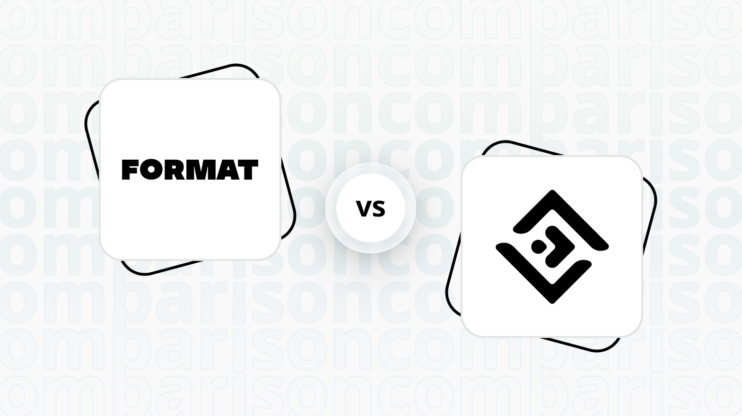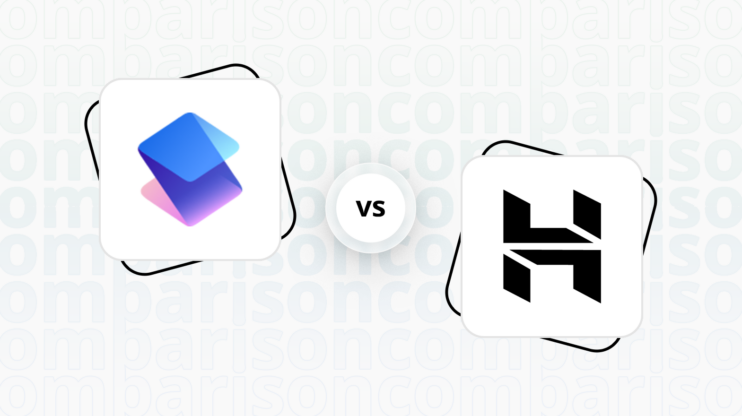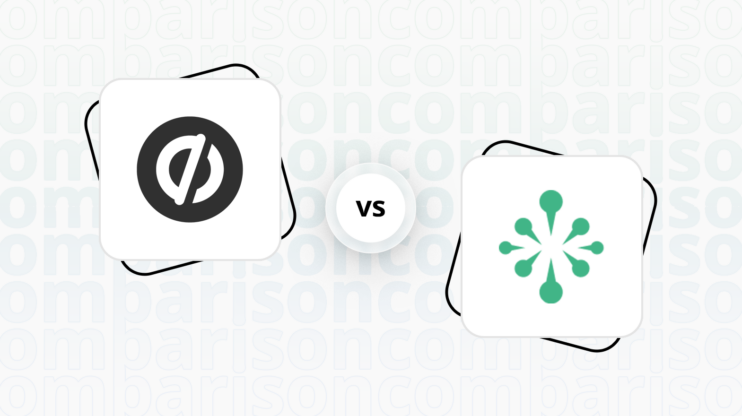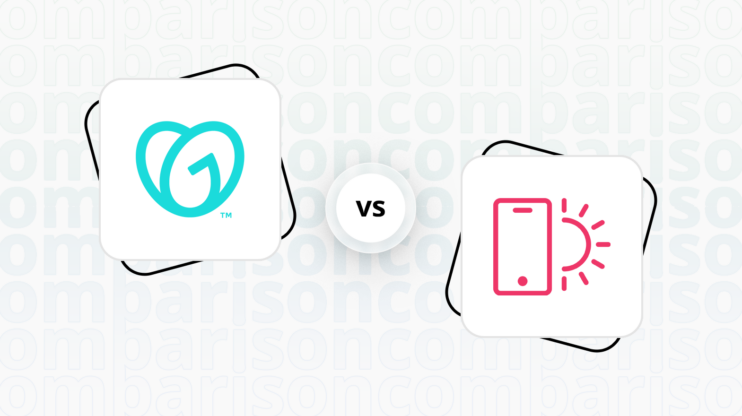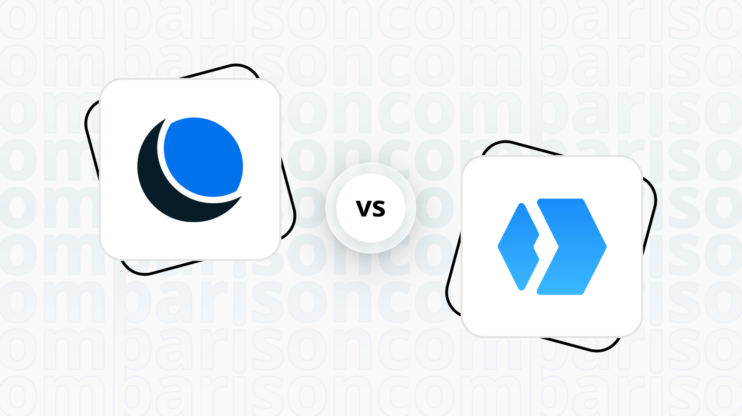Final verdict
Elementor and Sellfy cater to different audiences with distinct needs, making each platform suitable for specific use cases.
-
Elementor (Overall Grade: 7.4/10)
is a powerful website builder plugin for WordPress, known for its flexibility and extensive design functionalities. It offers a user-friendly drag-and-drop interface, making it ideal for both beginners and professional web designers. Elementor excels in providing a wide range of templates, advanced customization options, and robust ecommerce capabilities through WooCommerce integration. When comparing Elementor vs Sellfy, Elementor stands out for its comprehensive design tools and superior user management features. -
Sellfy (Overall Grade: 6.0/10)
is an all-in-one ecommerce platform tailored for creators looking to sell digital, physical, subscription-based, and print-on-demand products. It offers a simple, user-friendly interface that allows for quick setup of an online store without advanced technical skills. Sellfy is particularly strong in providing a streamlined ecommerce experience with essential tools for managing and marketing online businesses. In the Elementor vs Sellfy comparison, Sellfy is a great choice for creators who prioritize ease of use and a straightforward ecommerce setup.

|

|
|
|---|---|---|
|
Design functionalities & templates |
9.2 |
5.2 |
|
Ease of use |
8.8 |
7.8 |
|
Ecommerce |
7.6 |
6.8 |
|
Website Editors |
8.5 |
6.8 |
|
Product testing options |
5.6 |
7.3 |
|
Price |
8.0 |
7.9 |
|
Hosting quality |
7.8 |
7.3 |
|
Website speed optimization |
6.7 |
5.4 |
|
Plugins and integrations |
7.6 |
6.7 |
|
Marketing features |
7.8 |
7.1 |
|
Customer support |
7.2 |
5.8 |
|
Security |
9.1 |
7.2 |
|
AI capabilities |
7.4 |
0 |
|
User Management |
8.8 |
2.0 |
Best for ecommerce
 7.6
7.6
 6.8
6.8
Verdict
: Elementor is ideal for those seeking a highly customizable ecommerce solution integrated with WordPress, while Sellfy is perfect for creators looking for a straightforward, all-in-one platform.
-
Elementor
: With a score of 7.6, Elementor excels in providing a flexible and customizable ecommerce experience through its integration with WooCommerce. It offers a wide range of widgets and templates, making it suitable for both beginners and professional web designers. Elementor’s strength lies in its ability to customize every detail of a webpage, ensuring a unique and tailored online store. -
Sellfy
: Scoring 6.8, Sellfy is an all-in-one ecommerce platform tailored for creators selling digital, physical, subscription-based, and print-on-demand products. Its user-friendly interface allows for quick setup without advanced technical skills. Sellfy is ideal for those who want a simple, efficient way to manage and scale their online business without the need for extensive customization.
Best for informational & business websites
 8.9
8.9
 5.7
5.7
Verdict
: Elementor is the superior choice for creating informational business websites, thanks to its extensive design capabilities and user-friendly interface. Sellfy, while competent, is more tailored towards eCommerce and may not offer the same level of flexibility for informational sites.
-
Elementor
: Elementor excels in creating visually appealing and highly customizable informational websites. Its drag-and-drop interface, wide range of widgets, and extensive template library make it easy for users to design professional-looking sites without coding. With a score of 8.9, Elementor is ideal for businesses that prioritize design and user experience. -
Sellfy
: Sellfy, scoring 5.7, is primarily an eCommerce platform designed for creators selling digital and physical products. While it offers a straightforward website builder, it lacks the advanced design flexibility and extensive template options that Elementor provides. For purely informational websites, Sellfy may not be the best fit.
Detailed comparison
Design functionalities & templates
Design FunctionalitiesRepresents how well each platform allows for creative design and customization of websites.Score Components:
- Template Variety (30%): Range and quality of design templates.
- Customization (30%): Flexibility and options for design alterations.
- User Interface (20%): Ease and intuitiveness of the design process.
- Responsiveness (10%): Adaptability to different devices and screen sizes.
- Innovation (10%): Unique design features and tools.
 9.2
9.2
 5.2
5.2
🏆
Winner: Elementor.
If you’re looking for a platform that offers more creative control and a wide array of design features, Elementor is the preferred choice.
Elementor offers an extensive range of templates and designs, with over 100 responsive website kits covering various categories like business, creative, education, and more, directly available through Elementor’s platform. Additional sources like Envato Elements, Template Monster, and others provide a wider selection, including free and premium options, catering to diverse web design needs.
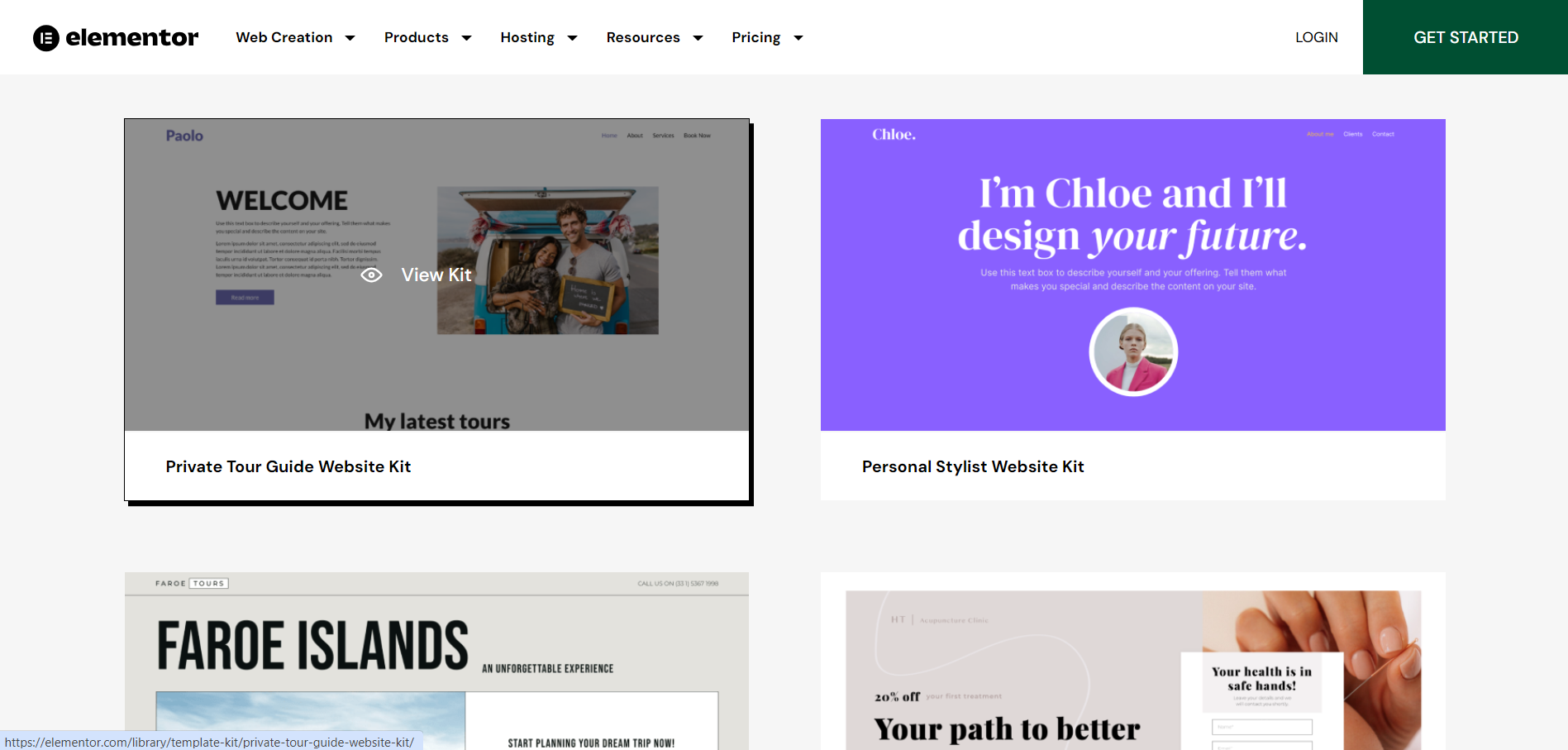
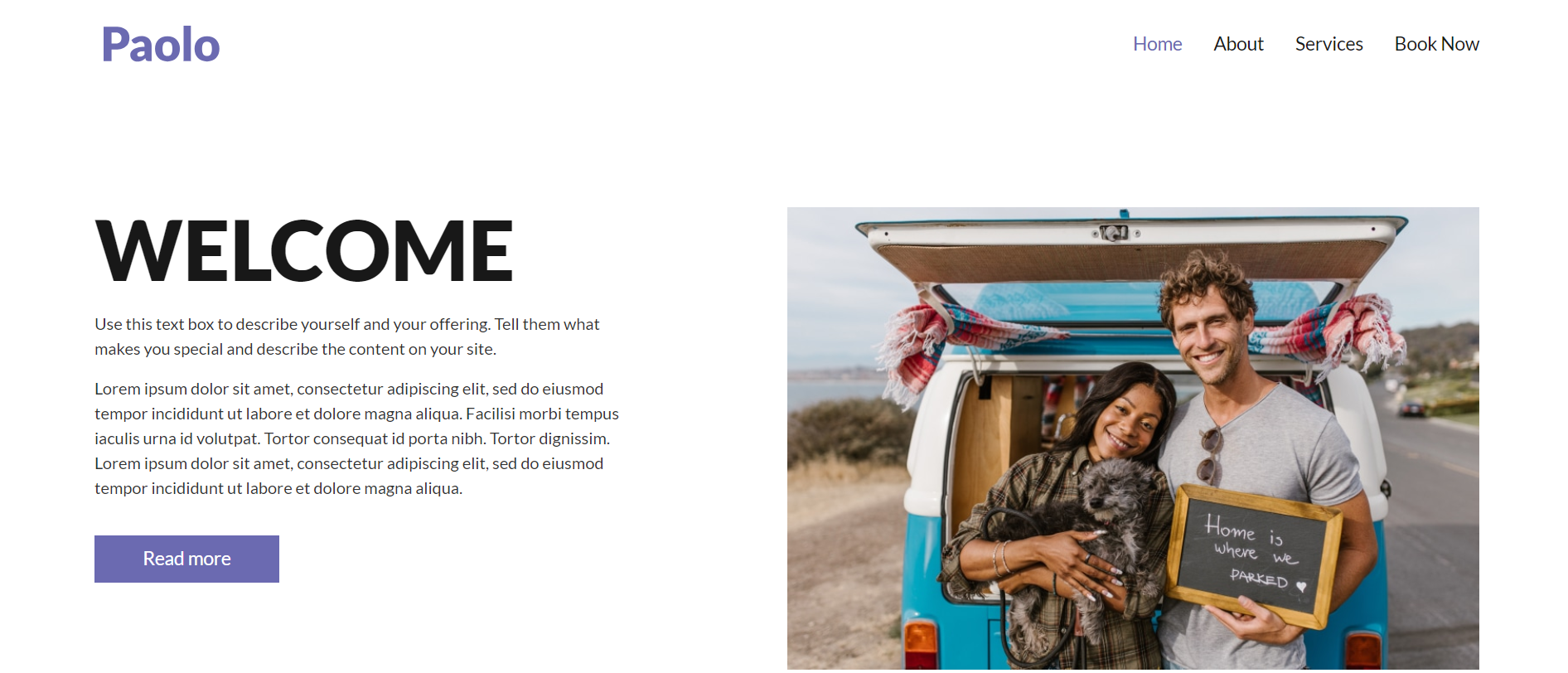
Compared to Elementor, Sellfy provides a collection of design templates through its theme store, located in the Store Customizer. Users have the option to preview these themes before applying them to their websites. As of the latest information, Sellfy offers five main theme options: Lumiére, Noir, Savant, Idée, and Mode. These themes cater to various aesthetic preferences and can be published to go live on a user’s website after selection and customization. However, Sellfy does not provide a link to its themes page and does not have a screenshot of its template page.
Get a head start on website creation with AI
Create a custom website tailored to your business needs 10X faster with 10Web AI Website Builder!
Ease of use
Ease of useReflects the platform’s overall user-friendliness.Score
Components:
- Learning curve (40%): Quickness and ease of getting started.
- Interface design (30%): Simplicity and intuitiveness of layout.
- User guidance (20%): Quality of tutorials and support.
- Flexibility (10%): Adaptability to various user skills.
 8.8
8.8
 7.8
7.8
🏆 Winner: Elementor
. Scoring an impressive 8.8, Elementor is renowned for its user-friendly interface and drag-and-drop functionality, making it easy for both novices and professionals to create websites. Sellfy, with a score of 7.8, offers a straightforward website builder, but it may not satisfy those seeking advanced design flexibility. If ease of use is a priority, Elementor is the clear winner in this category.
Learning Resources
🏆 Winner: Elementor
. Elementor provides an extensive array of learning resources suitable for both beginners and advanced users through its Elementor Academy. Sellfy, on the other hand, lacks a large community of users and does not offer as many learning resources.
For ecommerce
EcommerceMeasures the platform’s effectiveness in supporting online business activities.Score Components:
- Ecommerce themes and templates (20%): Variety and design of templates.
- Product management (25%): Ease of managing and organizing products.
- Payment options (25%): Variety and convenience of payment methods.
- Ecommerce features (20%): Features for managing an ecommerce store.
- Integration (10%): Compatibility with external e-commerce tools and services.
 7.6
7.6
 6.8
6.8
Elementor and Sellfy both offer ecommerce capabilities, but they cater to different needs and audiences. Elementor, with its integration with WooCommerce, provides a more customizable and flexible ecommerce solution, suitable for both beginners and professional web designers. Sellfy, on the other hand, is an all-in-one ecommerce platform tailored for creators looking to sell a wide array of products including digital, physical, subscription-based, and print-on-demand items. It offers a simple, user-friendly interface that allows for quick setup of an online store without necessitating advanced technical skills.

|

|
|
|---|---|---|
|
Ecommerce themes and templates |
7.8 |
7.0 |
|
Product page customization |
8.4 |
6.5 |
|
Payment processing and commissions |
7.5 |
8.0 |
|
POS capabilities |
5.5 |
4.0 |
|
Payment gateways |
7.0 |
6.0 |
|
Product numbers |
7.0 |
7.5 |
|
Additional ecommerce features |
8.0 |
6.5 |
Elementor ecommerce features:
- WooCommerce Integration
- Customizable Product Pages
- Ecommerce Widgets
- Product Categories and Filters
- Shopping Cart Customization
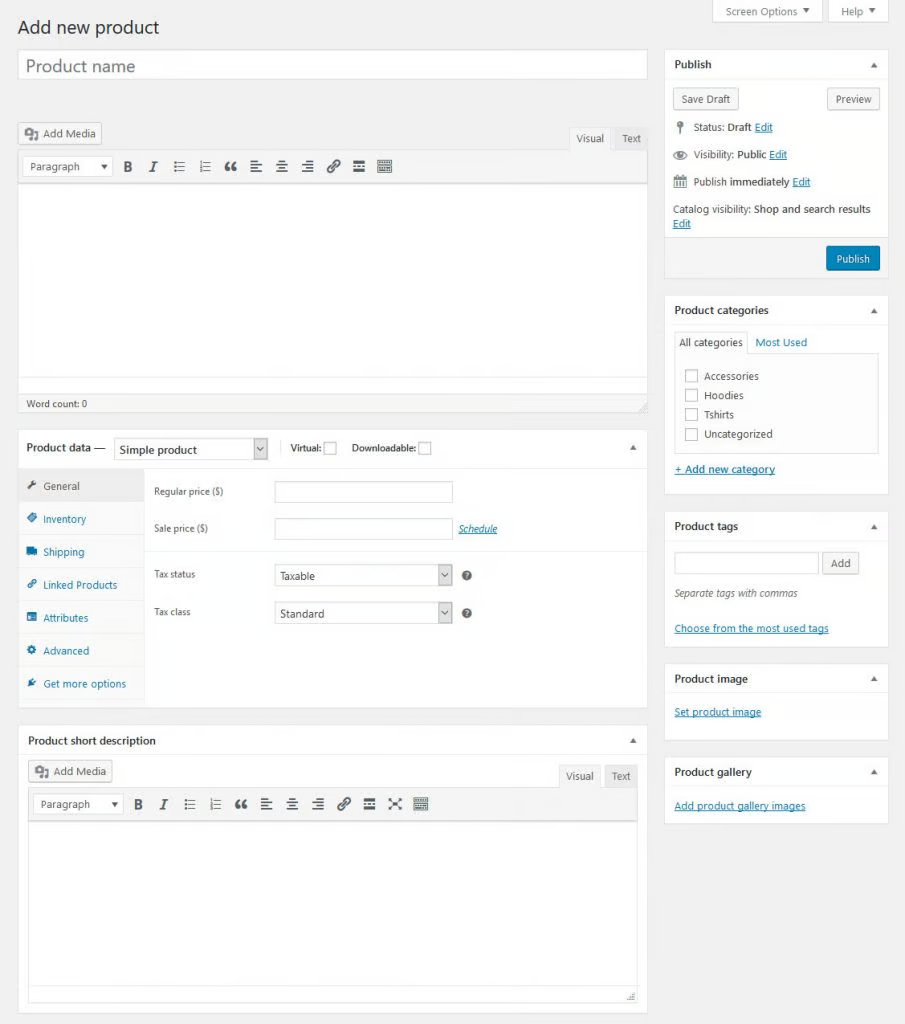
Sellfy ecommerce features:
- Product Listings
- Payment Gateways integration
- Product categories
Ecommerce themes & templates
Elementor offers a diverse range of ecommerce-specific templates suitable for various online stores, from free options for budget-conscious users to premium templates with advanced customization features. These templates are designed to be mobile-responsive and SEO-friendly, ensuring optimal performance across devices and search engines. On the other hand, Sellfy’s templates are designed specifically for online stores, offering a streamlined and focused approach to ecommerce design.
Product page customization
Elementor offers extensive customization options for WooCommerce product pages, including custom layouts, WooCommerce widgets for various product elements, and options for styling product galleries and ‘Add to Cart’ buttons. It allows for the display and customization of product variants, although the number of variants is technically limited by WooCommerce, not Elementor. Sellfy supports a diverse range of products including digital goods like music, videos, ebooks, and software, as well as physical products and print-on-demand merchandise such as t-shirts and mugs. The platform enables the sale of subscriptions, offering a means for recurring revenue.
Payment processing
Elementor supports several payment gateways, notably through plugins and integrations, with Stripe and PayPal being prominent options for simple and widespread use. These gateways charge their own transaction fees, typically around 2.9% + $0.30 per transaction, but Elementor itself does not impose additional fees for transactions. Sellfy supports two primary payment gateways, Stripe and PayPal, allowing for various payment options including credit/debit cards and localized payment methods in Europe. The platform does not charge transaction fees beyond its subscription cost, though payment processors’ standard fees apply.
Website Editors
Website EditorsEvaluates the platforms’ website building and editing capabilities.Score Components:
- Customization tools (40%): Range and power of editing features.
- Editor usability (30%): User experience within the editor.
- Design flexibility (20%): Freedom in layout and design changes.
- Update and maintenance ease (10%): Simplicity of updating and maintaining the site.
 8.5
8.5
 6.8
6.8
🏆
Winner: Elementor
. Elementor, with a score of 8.5, is a popular website builder plugin for WordPress that allows users to create and edit websites through a visual drag-and-drop interface. It offers a wide range of widgets and templates, enabling users to design their sites without needing to write code. Elementor is known for its flexibility, allowing for the customization of every detail on a webpage, making it suitable for both beginners and professional web designers.
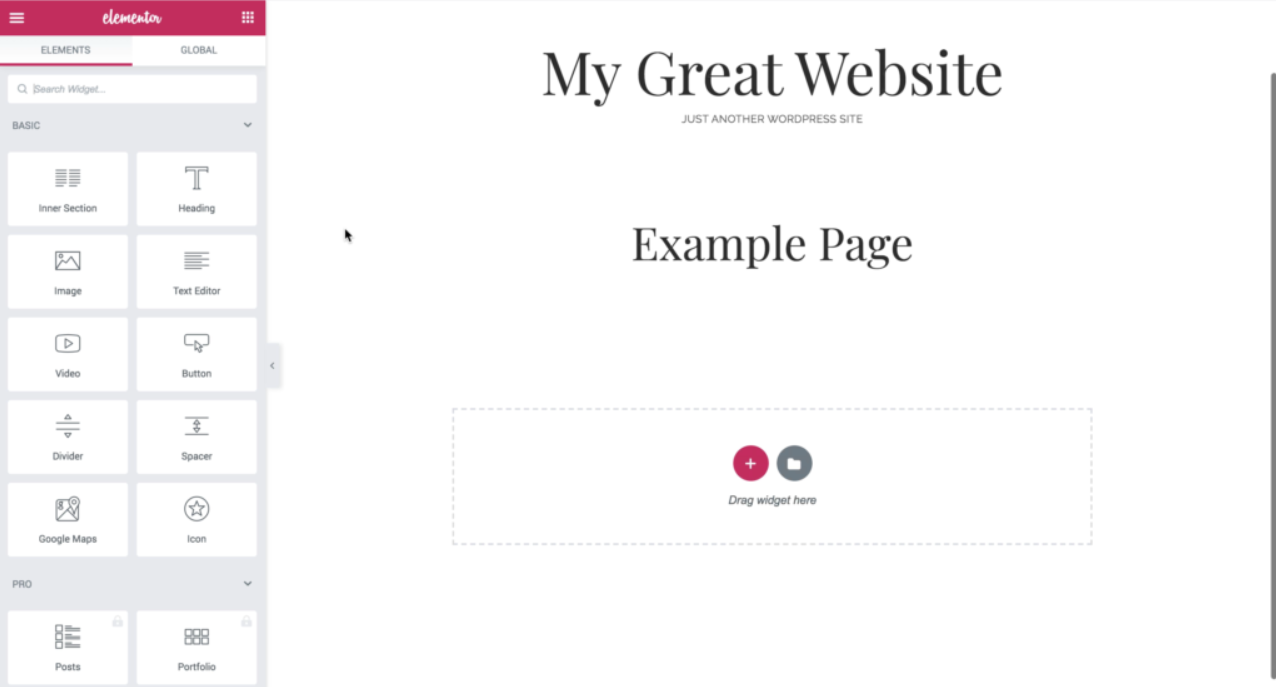
Sellfy, scoring 6.8, is an all-in-one eCommerce platform tailored for creators looking to sell a wide array of products including digital, physical, subscription-based, and print-on-demand items. It offers a simple, user-friendly interface that allows for quick setup of an online store without necessitating advanced technical skills. Despite some limitations in design customization and app integrations, Sellfy aims to provide a comprehensive e-commerce solution for entrepreneurs and creators.
Mobile editor/app
 0
0
 7.5
7.5
🏆
Winner: Sellfy
. Elementor does not have a dedicated mobile editor, which means it scores zero in this category. On the other hand, Sellfy offers a mobile app that allows users to manage their online stores on the go, offering functionalities such as viewing store performance metrics, managing and tracking orders, and receiving customized notifications. However, it’s not possible to change the layout or the design of the website itself.
Despite this limitation, Sellfy still scores higher than Elementor in this category due to its mobile management capabilities.
Product testing options
Product Testing OptionsAssesses the options for trying out platform features before commitment.Score Components:
- Trial quality (40%): Extent and usefulness of the trial or free version.
- Feature accessibility (30%): How many features are available to test.
- Trial duration (20%): Length of the trial period.
- Ease of transition (10%): Smoothness of moving from trial to paid plans.
 5.6
5.6
 7.3
7.3
Overall Result
:
Sellfy Wins
. Sellfy scores 7.3, outperforming Elementor which scores 5.6. Sellfy offers a 14-day free trial, during which users can test all premium features. Elementor, on the other hand, offers a free version but only for self-hosted WordPress.org, and does not provide a trial version. Both platforms offer a 30-day money back guarantee.

|

|
|
|---|---|---|
|
Free Plan |
Yes, but only for self-hosted WordPress.org |
No |
|
Trial Duration |
No |
14 days |
|
Testing Premium Features |
It is possible to test all the premium features during the refundable period. |
During the free trial |
Price
PriceLooks at the cost-effectiveness and value for money of each platform.Score Components:
- Plan value (40%): What each pricing tier offers.
- Transparency and clarity (30%): Clearness of pricing structures.
- Flexibility of plans (20%): Range of options to suit different budgets.
- Hidden costs (10%): Additional expenses not included in the plan.
 8.0
8.0
 7.9
7.9
Elementor and Sellfy have similar pricing scores, but Sellfy offers a discount for annual billing, which can make it a more cost-effective option for long-term use.

|

|
|
|---|---|---|
|
$0-$10 |
Basic ($9.99/month): 1 website, with 10GB SSD storage, 25k monthly visitors, 30GB monthly bandwidth, daily auto backups stored for 14 days, Cloudflare CDN, and integrated caching tool. Value for price: 6.5 |
No offering at this amount. |
|
$10-$20 |
Business ($19.99/month): 1 website, with 20GB SSD storage, 50k monthly visitors, 50GB monthly bandwidth, daily auto backups stored for 30 days, Cloudflare CDN, integrated caching tool and access to staging environment. Value for price: 7.5 |
No offering at this amount. |
|
$20-$30 |
Grow ($22.99/month): 3 websites, with 30GB SSD storage, 75k monthly visitors, 75GB monthly bandwidth, daily auto backups stored for 30 days, Cloudflare CDN, integrated caching tool, access to staging environment and site cloning. Value for price: 8.5 |
Starter ($29/month): Ideal for growing businesses with sales up to $10k/year. Offers unlimited products, digital and subscription products, domain connection, and 2,000 email credits. Annual savings available. Value for price: 7.5 |
|
$40-$80 |
Scale ($49.99/month): 10 websites, with 40GB SSD storage, 100k monthly visitors, 100GB monthly bandwidth, daily auto backups stored for 30 days, Cloudflare CDN, integrated caching tool, access to staging environment and site cloning. Value for price: 9.0 |
Business ($79/month): Targets businesses with up to $50k in yearly sales, offering everything in the Starter plan plus 10,000 email credits, product and store design migration, product upselling, cart abandonment tools, and Sellfy branding removal. Value for price: 8.0 |
|
$100+ |
No offering at this amount. |
Premium ($159/month): For businesses with up to $200k/year in sales. Includes everything in the Business plan plus 50,000 email credits, product migration, and priority support. Annual savings are also offered. Value for Price: 8.5 |
location. As a result in rare cases the prices displayed here can differ from the ones you see on their
websites.
Hosting quality
Hosting
qualityExamines the reliability and performance of the hosting solutions.Score Components:
- Uptime (40%): Consistency and reliability of website availability.
- Speed (30%): Loading times and performance.
- Bandwidth and storage (20%): Sufficiency of resources provided.
- Data centers (10%): Quality and distribution of hosting infrastructure.
 7.8
7.8
 7.3
7.3
🏆
Winner: Elementor
Elementor offers managed WordPress hosting with a 99.9% uptime guarantee and one data center in Belgium. Sellfy also offers hosting, but does not disclose the type of hosting or the locations of its data centers. However, it has a higher uptime of 99.99%, but no uptime guarantee. Elementor’s transparency and guarantee give it the edge in this comparison.

|

|
|
|---|---|---|
|
Do they offer hosting? |
Yes, included in all their plans |
Yes |
|
Data Centers: |
1 data center in Belgium |
Sellfy does not disclose the locations of its data centers |
|
Type of hosting: |
Managed WordPress Hosting |
Sellfy does not disclose the hosting type |
|
Uptime: |
99.9% |
99.99% |
|
Uptime Guarantee: |
Yes, 99.9% |
No |
Website Speed Optimization
Website Speed OptimizationEvaluates optimization of website loading timesScore Components:
- PageSpeed Score (30%): Google’s score indicating performance optimization.
- Loading Time (30%): The average time until a website is fully interactive.
- Mobile Optimization (15%): Optimization effectiveness for mobile devices.
- Resource Optimization (15%): Optimizing images, scripts, and other heavy resources.
- CDN Usage (10%): Use of CDN to enhance speed across geolocations.
 6.7
6.7
 5.4
5.4
🏆 Winner: Elementor
Both Elementor and Sellfy have strategies in place for website speed optimization. However, Elementor’s approach, which includes Lazy Loading, Code Minification, Caching, and CDN, is more comprehensive than Sellfy’s, which focuses on Code Minification, Caching, and Image Optimization.

|

|
|
|---|---|---|
|
Focus |
Website Builder |
Website Builder |
|
Performance Tools |
Lazy Loading, Code Minification, Caching, CDN |
Code Minification, Caching, Image Optimization |
|
Key Strategies |
Lazy Loading, Code Minification, Caching, CDN |
Code Minification, Caching, Image Optimization |
|
Load Times |
Varies depending on optimization and website complexity |
Varies depending on optimization and website complexity |
|
Page Speed Scores Range |
Varies depending on optimization and website complexity |
Varies depending on optimization and website complexity |
|
Core Web Vitals Improvement |
No information disclosed |
No information provided |
Elementor, a popular website builder plugin for WordPress, uses a variety of strategies for website speed optimization. These include Lazy Loading, which delays the loading of non-critical resources at page load time; Code Minification, which reduces the size of the code without changing its functionality; Caching, which stores copies of files so they can be accessed more quickly; and CDN, which distributes the load of delivering content.
Sellfy, on the other hand, is an all-in-one eCommerce platform that focuses on Code Minification, Caching, and Image Optimization for website speed optimization. Code Minification reduces the size of the code, Caching stores copies of files for quicker access, and Image Optimization reduces the file size of images without degrading their quality.
However, both platforms do not provide specific information about their Core Web Vitals improvements. The load times and PageSpeed scores also vary depending on optimization and website complexity. Therefore, the comparison is mainly based on the strategies for speed optimization.
Get a head start on website creation with AI
Create a custom website tailored to your business needs 10X faster with 10Web AI Website Builder!
Plugins and integrations
Plugins and integrationsMeasures the range and effectiveness of additional plugins and integrations.Score Components:
- Variety of options (40%): Range of available add-ons.
- Integration smoothness (30%): Ease of integrating plugins into the site.
- Quality of plugins (20%): Functionality and reliability of the options.
- Custom integration capabilities (10%): Support for custom or third-party integrations.
 7.6
7.6
 6.7
6.7
🏆 Winner: Elementor.
With a score of 7.6, Elementor leads in this category. It offers a wide range of both free and premium add-ons that extend the functionality of the base version, offering advanced widgets, modules, and complete theme building capabilities for deep customization. Key integrations include email marketing platforms like MailChimp, AWeber, and ActiveCampaign, WordPress plugins such as WooCommerce and Yoast for SEO, and social networks like Facebook SDK and YouTube.
Sellfy, scoring 6.7, also offers various integrations for its website builder, including Google Analytics, Facebook Live Chat, Zapier, and social media advertising tools, to enhance ecommerce functionality and automate workflows. However, Elementor’s extensive range of add-ons and integrations gives it the edge in this category.
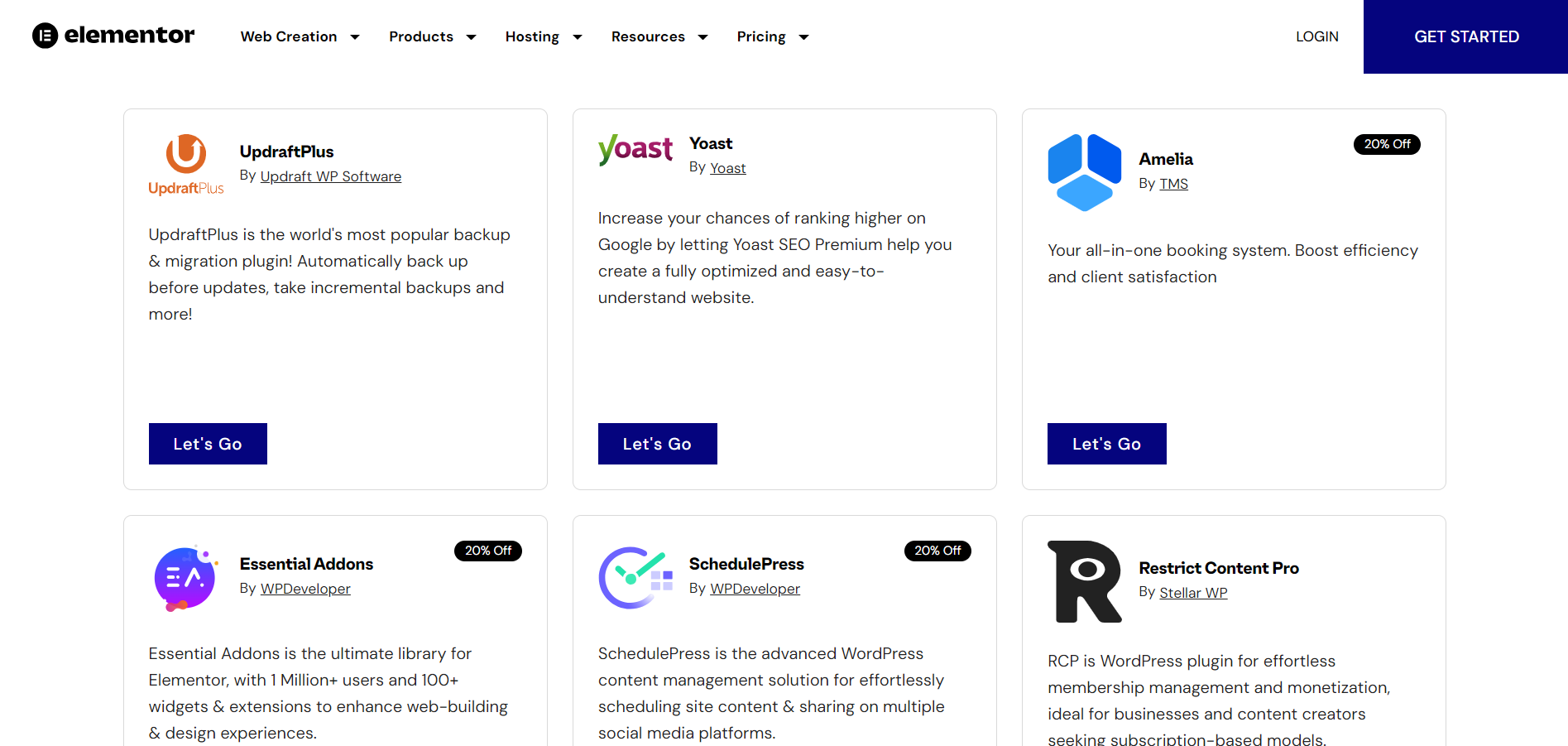
Marketing Features
Design FunctionalitiesRepresents how well each platform allows for creative design and customization of websites.Score Components:
- Template Variety (30%): Range and quality of design templates.
- Customization (30%): Flexibility and options for design alterations.
- User Interface (20%): Ease and intuitiveness of the design process.
- Responsiveness (10%): Adaptability to different devices and screen sizes.
- Innovation (10%): Unique design features and tools.
 7.8
7.8
 7.1
7.1
🏆
Overall Winner: Elementor
. Elementor stands out for its wide range of marketing features, including SEO tools, email marketing, blogging, social media integration, analytics and reporting, and ads and promotions. Sellfy, while offering a comprehensive set of marketing tools, lacks blogging features, which are essential for content marketing.

|

|
|
|---|---|---|
|
SEO Tools |
|
|
|
Email Marketing |
|
|
|
Blogging |
|
|
|
Social Media Integration |
|
|
|
Analytics and Reporting |
|
|
|
Ads and Promotions |
|
|
Customer Support
Customer supportEvaluates the quality and availability of support options.Score Components:
- Response time (40%): Speed of support responses.
- Support quality (30%): Effectiveness and helpfulness of the support.
- Availability (20%): Range of support channels (phone, chat, email).
- Resource richness (10%): Quality of self-help and educational materials.
 7.2
7.2
 5.8
5.8
🏆 Winner: Elementor
. In the Elementor vs Sellfy comparison, Elementor takes the lead with a customer support score of 7.2. Elementor provides 24/7 support through ticketing and live chat, ensuring users can get help whenever they need it. This round-the-clock availability, combined with a global team of Customer Experience agents, makes Elementor a reliable choice for continuous support.
Sellfy, on the other hand, offers 24/7 support but lacks phone and live chat options, which limits the immediacy of assistance. With a customer support score of 5.8, Sellfy’s support is primarily available through email and possibly a knowledge base, which might not be as responsive as Elementor’s live chat service. While Sellfy ensures support is available at any hour, the limited channels may affect the overall user experience.
Security
SecurityLooks at the platforms’ security measures and data protection.Score Components:
- Data protection (40%): Safeguards for user and customer data.
- SSL and encryption (30%): Implementation of secure connections.
- Compliance (20%): Adherence to industry security standards.
- Regular updates (10%): Frequency of security updates and patches.
 9.1
9.1
 7.2
7.2
🏆
Winner: Elementor
. Elementor’s security measures are robust and comprehensive, leveraging Google Cloud’s infrastructure for high security, including end-to-end encryption. The platform also employs both active and passive security measures, including 24/7 monitoring, regular updates, backups, and specialized security protocols to protect against common threats. Elementor’s commitment to security is further emphasized by its ISO 27001 certification and a proactive Bug Bounty program.
Although it may not offer the same level of specialized security features as Elementor, Sellfy focuses on the security of digital products and transactions. It employs several security measures to safeguard sellers and their digital products from unauthorized access, fraud, and piracy. These measures include the use of secure payment processors like Stripe and PayPal, unique download links for each purchase, limited download attempts, and additional tools like PDF stamping to deter content sharing. However, compared to Elementor, Sellfy’s security measures are less comprehensive, which is reflected in its lower security score.
AI Capabilities
AI capabilitiesMeasures the effectiveness of AI-driven features and tools.Score Components:
- Automation efficiency (40%): Impact of AI on streamlining processes.
- Personalization (30%): AI-driven customization for users or customers.
- AI-Assisted design (20%): Role of AI in website design and functionality.
- Data analysis (10%): Use of AI in interpreting user data and analytics.
 7.4
7.4
 0
0

|

|
|
|---|---|---|
|
AI Builder |
Elementor’s AI builder generates text, custom codes, and images directly within the editor |
|
|
AI Ecommerce features |
AI-driven features for generating container layouts, custom images, text, and code |
|
|
AI Content Generation |
AI writing assistant for creating original, brand-consistent text quickly |
|
|
Additional AI features |
Ability to integrate third-party AI-powered WordPress plugins or widgets |
|
🏆 Winner: Elementor
. Elementor, with a score of 7.4, offers a range of AI capabilities including an AI builder, AI-driven eCommerce features, AI content generation capabilities, and the ability to integrate third-party AI-powered WordPress plugins or widgets. These features enhance efficiency and creativity in web design, making Elementor a powerful tool for building and customizing websites.
Sellfy, on the other hand, does not have any AI capabilities. This lack of AI features may limit the efficiency and customization options for users building and managing their online stores on Sellfy.
User Management
User ManagementAssesses the platforms’ capabilities in managing user roles, permissions, and accessibility.Score Components:
- Role Customization (40%): Flexibility in creating and defining user roles and
permissions. - Ease of Management (30%): User interface and tools for managing users.
- Access Control (20%): Effectiveness of access control measures for different user
levels. - Scalability (10%): Ability to manage a growing number of users efficiently.
 8.8
8.8
 2.0
2.0
🏆 Winner: Elementor
. Elementor and Sellfy offer different levels of user management capabilities.
- Elementor, being a WordPress plugin, inherits WordPress’s user management system. It allows multiple users with different roles and permissions to manage and edit the website. The number of users is determined by the roles assigned by the site administrator. Elementor Pro offers a Role Manager feature for further customization of user roles within Elementor.
- Sellfy, on the other hand, does not support adding multiple users or staff to a single account.
Elementor User Roles and Access Levels:
| Role | Description | Access Highlights |
|---|---|---|
| Administrator | Users with full access to all administration features, including Elementor settings. | Can edit all content, Access to Elementor settings, Can install plugins and themes, Can manage users |
| Editor | Users who can manage and publish content including pages and posts. | Can edit pages/posts created with Elementor, Cannot access Elementor settings, Can manage categories, tags, and links, Can moderate comments |
| Author | Users who can publish and manage their own posts. | Can create posts with Elementor, Cannot edit pages, Limited access to media library, Cannot access Elementor settings |
| Contributor | Users who can write and manage their own posts but cannot publish them. | Can create content with Elementor, Cannot publish or edit pages, No access to Elementor settings, Submissions require review by higher-level roles |
Sellfy User Roles and Access Levels:
Sellfy does not support adding multiple users or staff to a single account.
Additional Features

|

|
|
|---|---|---|
|
SSL Certificate |
|
|
|
Custom Domain |
|
|
|
Free Custom Domain Included |
|
|
|
International Domains |
|
|
|
Mobile Responsive |
|
|
|
Page Speed |
|
|
|
Website Builder Mobile App |
|
|
|
Convert a Website To An App |
|
|
|
Website Analytics |
|
|
|
Multilingual Sites |
|
|
|
Multiple Users |
|
|
User Feedback
Elementor is widely appreciated for its intuitive drag-and-drop interface, enabling rapid creation of professional and responsive websites without coding skills. It offers a vast range of templates and compatibility with WordPress, making it a go-to for diverse users. Despite its benefits, concerns arise regarding website loading times, subscription costs, and occasional compatibility issues. Feedback on customer support and legacy plan management is mixed, with some users experiencing dissatisfaction. Overall, Elementor is valued for its efficiency in web development, although some aspects, particularly support services, could be improved.
The user feedback on Sellfy highlights its strengths in providing an efficient, compact online store setup that caters to specific needs with affordable pricing, including a 14-day trial period to familiarize users with the product. Many appreciate its user-friendly interface, internal marketing tools, and customization options, which enable sellers to tailor their storefronts to their brand, along with integrations for payment processing like PayPal and Stripe. However, criticisms include issues with mobile site speed, a desire for clearer insights, limitations on customization, and some customer service inefficiencies.
The making of this blog
We followed a clear, step-by-step process to write and research this article.
FAQ
Which platform is better for ecommerce, Elementor or Sellfy?
Can I use Elementor if I'm not familiar with coding?
Is Sellfy a good choice for creating a content-rich website?
How do Elementor and Sellfy compare in terms of design capabilities?
Which platform offers better customer support, Elementor or Sellfy?
Are there any AI capabilities in Elementor or Sellfy?
Can I manage multiple users with either Elementor or Sellfy?
Which platform is more secure, Elementor or Sellfy?










